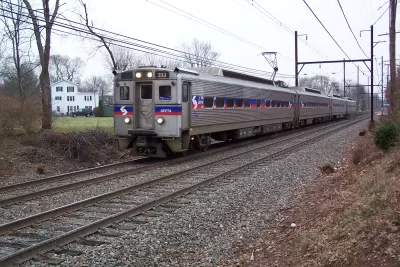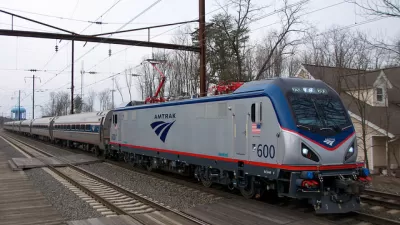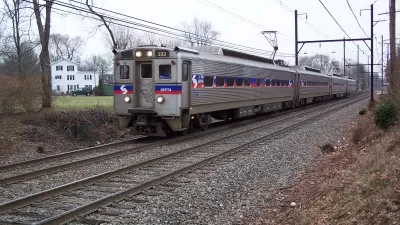A plan to get a SEPTA Regional Rail link to Phoenixville in record time has its skeptics, but advocates are convinced they can make it happen.

Phoenixville is a Pennsylvania Rust Belt town that bounced back from deindustrialization and today is home to craft breweries and mixed-use development. Now it wants to give itself a boost by connecting the town to SEPTA Regional Rail service.
A new proposal outlines a plan to get service up and running within 18 months of stakeholders agreeing to move forward. Jim Saksa explains that kind of schedule for a transportation project is unusual:
That would be nothing short of revolutionary in the world of public infrastructure, where projects are planned decades in advance and costs often grow like boa constrictors let loose in the Everglades, swelling to terrifying dimensions and strangling all they run across.
The pilot project calls for using Norfolk Southern freight tracks to connect Phoenixville to an existing SEPTA line. The projected cost for three barebones stations—just parking lots and platforms—and infrastructure upgrades is $15 million, with another $3 million a year to run the trains.
Critics of the plan say the cost estimates for building the stations and renting rails, rolling stock, and dual-mode locomotives are unrealistic. In addition, mixing freight and passenger service poses additional challenges.
Still the residents of Phoenixville are optimistic they can pull it off. "That’s an attitude born of Rust Belt rebirth -- the feeling that not all lost causes are lost, that through pluck and luck and some smalltown gumption, even the impossible is possible," observes Saksa.
FULL STORY: A long-shot plan to extend Regional Rail to Phoenixville could revolutionize how infrastructure is built

Maui's Vacation Rental Debate Turns Ugly
Verbal attacks, misinformation campaigns and fistfights plague a high-stakes debate to convert thousands of vacation rentals into long-term housing.

Planetizen Federal Action Tracker
A weekly monitor of how Trump’s orders and actions are impacting planners and planning in America.

In Urban Planning, AI Prompting Could be the New Design Thinking
Creativity has long been key to great urban design. What if we see AI as our new creative partner?

King County Supportive Housing Program Offers Hope for Unhoused Residents
The county is taking a ‘Housing First’ approach that prioritizes getting people into housing, then offering wraparound supportive services.

Researchers Use AI to Get Clearer Picture of US Housing
Analysts are using artificial intelligence to supercharge their research by allowing them to comb through data faster. Though these AI tools can be error prone, they save time and housing researchers are optimistic about the future.

Making Shared Micromobility More Inclusive
Cities and shared mobility system operators can do more to include people with disabilities in planning and operations, per a new report.
Urban Design for Planners 1: Software Tools
This six-course series explores essential urban design concepts using open source software and equips planners with the tools they need to participate fully in the urban design process.
Planning for Universal Design
Learn the tools for implementing Universal Design in planning regulations.
planning NEXT
Appalachian Highlands Housing Partners
Mpact (founded as Rail~Volution)
City of Camden Redevelopment Agency
City of Astoria
City of Portland
City of Laramie




























